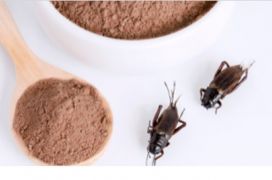Utilizing NGS for Species Authentication in Insect-based Food and Feed

source: FoodPro Network International
Entomophagy, the consumption of insects and their use in food has largely been absent from western civilization for cultural reasons. However in recent years economic and environmental reasons have driven a more general acceptance of insects’ consumption. In fact, this practice has been recommended by the United Nations as a way to circumvent the food shortage problem created by an ever-growing global population. The European Food Safety Authority (EFSA) is publishing strict legislation on a case-by-case basis covering 7 approved insect species for feed and one for food thus far.
Therefore, the application of Next-Generation Sequencing (NGS) with metabarcoding for the correct identification of these and other non-approved insect species in food matrices, is relevant to guarantee compliance with current legislation.
Agenda:
- Introduction: Insects in food and feed
- EFSA authorization of novel foods
- Advantages and disadvantages of insect consumption
- What is NGS?
- NGS application to insect species identification
- Q&A
Speakers
Franck Pandiani - Global Business Manager Food Molecular Biology, SGS
Based in France, Franck Pandiani is the Global Manager for SGS Food Molecular Biology. He has a PhD in Biochemistry & Molecular Microbiology from Université d'Avignon et des Pays de Vaucluse and a Master 2 in Biochemistry-Nutrition & Food Safety from the Université Paul Cézanne (Aix-Marseille III).
Cristina Barbosa - Competence Centre for Molecular Biology (CCMB) Manager, SGS
Research & Development Manager working internationally on molecular biology expansion. Skilled in NGS, digital PCR and other molecular biology techniques applied to health and nutrition. Cristina has a PhD focused on Human Molecular Biology from Faculdade de Ciências da Universidade de Lisboa.
Bron: SGS - partner FoodPro Network
Latest news
-
11 jan Nestlé Vietnam invests $100 million in coffee factory to meet growing consumer demand
-
11 jan TraceGains' Together Conference 2024
-
11 dec Alex Holt appointed Chief Sustainability Officer of Ahold Delhaize
-
29 nov Nestlé develops N3 milk with new nutritional benefits, launches first in China
-
21 nov Grocery shopping in Australia
-
20 nov Centuries-old-fermentation technique all hot again
-
12 sep The limits of exports
-
18 aug Detecting and Preventing Coffee Fraud
-
14 aug Connecting the world of food professionals
-
10 aug Sky-high expectations for vertical agriculture
Join the conversation
Are you already a member? Please
Login
Don't have an account yet? Please register